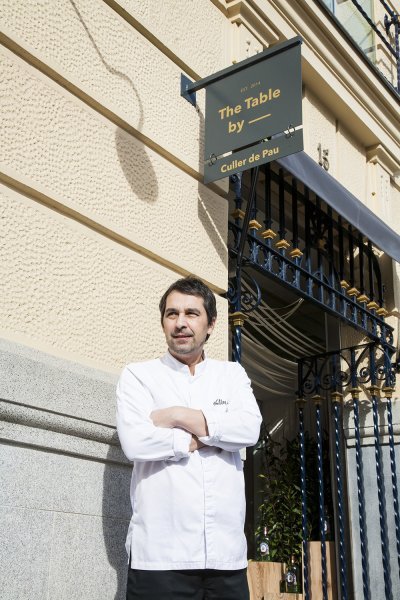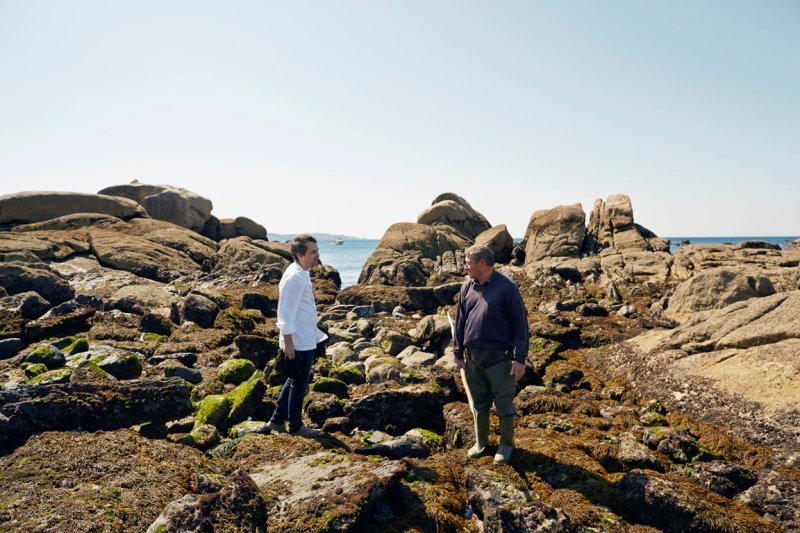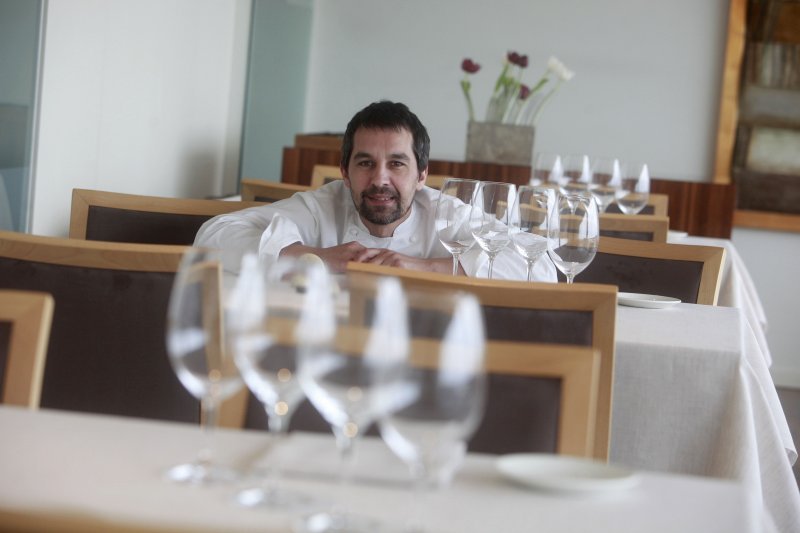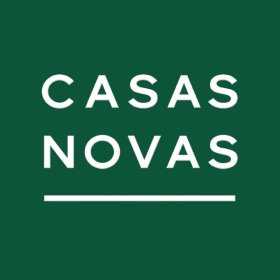Javier Olleros
galicia | Dec 2019

“I think Galicia, in essence, has always been at its best”.
Interviewing Javier Olleros is rather easy for me. I’ve been to Culler de Pau many times and I am fortunate to have worked with them and to have spent time with the team. I deeply appreciate the way they work, their approach and their cooking style. I only wish that their land and their interpretation of it were mine also: I want Galicia to be my second home. My grandfather was born in San Miguel de Neira de Rei, in Lugo and its varied and untamed landscape fills me with the desire to live there, in the North, every time I cross O Cebreiro.
Culler de Pau is the epitome of the very essence of Galicia, an apparent set of contradictions –unhurried yet very focussed, approachable yet mysterious, open yet veiled– all of which are turning it into a place of pilgrimage for lovers of gastronomy, unspoilt nature and its unique character.
This interview is conducted with admiration. I remember very well the day that I saw Javier Olleros in “The Table by”, working, book open, on the next season’s menu. That was the moment that I understood that cooking is not only a creative process that connects emotionally with what can be presented but, above all, the importance of first finding out, making discoveries and studying the whole story so as to best understand its heritage and knowledge, and transform them into innovation. Culler is the internal dialogue of a family dedicated to Galicia that looks outwards in search of a reflection that is not exclusively gastronomic.

Javier, I’m sorry to start the interview as I imagine they have done most times, but how was Culler de Pau born?
Well, we are born from an emotion, from the illusion of making a restaurant linked to a territory, to my village, and to a feeling of belonging to the place where Amaranta and I feel comfortable.
Is O Grove the origin?
I am son of emigration, a Galician born in Switzerland; with a chef father and a mother dedicated to catering, I saw them work all their lives. When they returned to O Grove, I started giving them problems. I was always a troublemaker, a bad student, a restless child who was annoyed by the established method and subject. It took me some time to understand what academics could do for me.
That’s curious because, knowing your cuisine and your way of working, the last thing I would say is that you were a troublemaker and a bad student: now you dedicate time to research, you rely on the study of history to create dishes, and you have a very special sensibility.
That’s right, the only thing is that I didn’t fit in the framework, in the rigidity of the method. But I was curious and I’ve always been interested in going further. It is true that what before seemed boring to me, today seems very interesting. Now, for example, I’m reading a book about the history of salt. But watch out, I’m still the same troublemaker!
Well I do believe that in that dialogue between freedom and order, creativity and study, between the bad boy and the thoughtful one, lies part of your success. Would you say that you are an intellectual chef?
Those are major words! But of course I like to investigate and understand the whys and wherefores of things. I’m a curious chef, and I search among books, suppliers, and the past with the aim of getting to the origin of things. That gives me arguments to face the future and create with greater basis.

For me it’s part of your secret. You prove that gastronomy demands a creative exercise and a search for external and distant references, but it also has to pay attention to the history and traditions of the context in which it takes place, which in this case is Galicia.
That’s right, you have to know where you come from, and create a personality and a character on that basis. It is essential to stimulate ourselves and let us go, but always without forcing it. I used to do it in my village, my countryside, my sea, my walks, moments in which I stop to organize all those impulses.
How important it is to stop when the general message is exactly the opposite...
The only thing I force myself to do is stop and think. That’s what I hope will allow me to reach my goal and find my particular truth.
Are you reaching maturity?
It’s a job of time, of getting rid of what doesn’t interest you, of finding yourself. Little by little I manage to find my practice and my method to get my result.

Sensibility, feeling, method and practice. Everything sounds very oriental.
Well, Japan and Galicia, apart from distances, have many points in common. I travelled there and immerse myself in their culture. Beyond Takahide Tamaka, a colleague who has run our kitchen since the beginning of Culler de Pau, it is a culture that has given me a lot. The value of artisan work, the importance of study, the search for balance...
Do you think you’ve found the balance between these values and the business?
I’m a dreamer, but I believe less in chimeras and more in useful things. My priority is to move by impulses, by tastes and feelings, but everything must have a practical and organized form. We are a small restaurant, but we are taking more and more risks: we have a vegetable garden, an R&D space, a production area... We are growing and we achieve everything through order and perspective.
Entrepreneurial chef?
Of course I am. But I’m a specialized chef, not a businessman. I don’t know the codes of business language. What I do is surround myself with people who are smarter than I am, capable of managing, who I listen to and who help me.
Will we see an international expansion of Culler de Pau?
Maybe it falls on my head, but I don’t think we’ll set up another restaurant. I can consider things, but of course it would be something that doesn’t require me to be away from home, which is where I have to be. My obsession is not to get too much out of me.
You are clearly the definition of a family restaurant: you live in the same building; your wife Amaranta is a key figure; Taka has been there since before opening Culler de Pau... How did you manage to find stability in the team when the complaint is constant in the field?
There is a lot of instability in this area of the industry, but it is a reality and we have to deal with it. We know that the team is going to move and we keep fitting the pieces together. When someone leaves, they leave a pose, but the next one that comes in makes us a little better. That’s growing.
I know how important Amaranta is for the team and for the project. What would you do without her?
Amaranta is the base of this house. She is the person who supports the project and maintains its balance. She helps me to take perspective, provides vision and is the lighthouse that guides Culler de Pau.
And your team, what do they thank you for?
As you said before, Culler de Pau is my home, we live on top of it. We feel it intensely. I’m interested in people. I think we are wrong, most of the time the problem is not the player, but the trainer. You have to know that everyone has their own rhythm, value and potential. I observe and accompany the people I work with so they give the best of themselves and feel satisfied with their well-done work.

The trainer has a method for players to win. I love it.
Of course, think that all this comes from a crazy chef and his partner; we have to transmit our passion with order so the idea can be executed. How do you make someone understand what’s inside you? With communication, meetings, rigour, example, being always on top, at the same time than listening and accompanying.
Sounds like a winning formula.
But watch out, this is not so easy. There is a high demand. Each one has his role, his responsibility and is demanded on that basis. I come from a hierarchical school in which I didn’t work, and in spite of that, at the beginning I implemented the same system. I almost became what I didn’t want to be. I went so far as to scream and pour my insecurities into the team, with the consequent torment that it entailed. But there was a learning process and a search for a more sustainable, collaborative and rewarding practice. Now we are starting to harvest the result.
Do you think your environment has a strong influence on this equation?
I think Galicia, in essence, has always been at its best. It’s a UNIQUE place. Now is the time to take advantage of what once weighed us down and complexed us: being on the corner of the peninsula, the village, the conservative and excessive, and even the climate, once always bad, are now differentiating elements that mark our style.
You give me goosebumps. I can tell you’re saying it the way you feel it. How important it is to stop and think, even more so in a world where there is so much noise...
In a world so standardized, in which there is an excess of information and which is being exhausted more and more quickly, Galicia has an unknown story in every corner that turns it into an oasis of calm. The way the rhythms are now on the planet, it has a very powerful ecosystem and a unique diversity. Now we have to believe in this, and tell it so that it goes far and transcends. But I am convinced that it is a land with an exceptional history on which we, cooks, can tell a significant part.
They’ve been telling us for a long time that we have to move forward, grow constantly, hurry to get to as many places as possible, but to find yourself, with a model of life opposed to that, may seem like a real oasis to some of us.
Everything is going very fast. This rhythm is not the natural one.
But the nice thing is, that at the same time when someone tries your cuisine, in spite of speaking about tranquillity, slowing down, looking more, not hurrying so much, what you do is exceptionally avant-garde.
There is an ant’s work, Miguel. It seems that here at O Grove we don’t do things, sometimes even having the feeling that we are not sufficiently recognized. But it’s the rhythm we want, that’s how we work. If you have clear objectives, and the principles are there, we can become happy through that work.
But have you ever felt unrecognized? Because you are the most loved, and the one that everyone wants to see.
Yes, there are certain complexes. We are informed, we know what is happening, and sometimes ....
Why does this one have three stars and we don’t?
No, the truth is we don’t think about that. But there are certain moments when we say, “Why don’t more people come here, with the serious and rigorous work we’re doing?”. Anyway, now I’m more aware of it. Time, persistence, calm, everything gives its result. I am aware that it can be the consequence of my actions: if I want to stop and think, move on forward calmly, it will affect the rhythm of Culler de Pau. I imagine that doubting is normal with the amount of information we receive, but in the end I always think: “Calm down, I’m doing fine”.
And do you think that if there was more support from the administration and governments for gastronomy or food education, answering that question would be easier?
It’s clear to me that as a chef and as a citizen we have to be watchful. We want those values that can be transmitted through food to be real. We see the plans of governments and they are idyllic, but the reality is that it’s difficult to stand up for the product, its producers, tradition, nature, and things well done. All this is increasingly being forgotten, and although it may seem the opposite, the planet doesn’t seem to be the priority.
The diet has been undervalued for a long time. It may be time for the chefs to take the strings.
I insist: we have to watch out, try to get politicians to do what they say. The administration has a lot to say and the countryside will once again be the main character.
Don’t you have the feeling that restaurants are the first classroom for many clients? It seems that until you tell the customer where a product comes from or how it is made, the milk is produced...
We must learn from what is done outside. France does a great job, we have to seek a common goal and give visibility to nature. Spain has an incredible field and we have the option of decongesting. It would be necessary to lavish less pavement and more knowledge of the environment.
The feeling is that there is a polarized society: some McDonalds, and others very conscious. How do you see the future of nutrition?
This accompanies the rhythms of society, it is increasingly unfair and unequal. Appealing to the cheap, which unfortunately is linked to the unhealthy and fast, is a need for part of the population. Unfortunately, a good diet is becoming more exclusive and more expensive. The balance is in education. Schools have to show where a cow grazes, how a hen lays an egg. We have to generate a culture of value and teach that food is fundamental. If not, it will get out of control.
What can we do?
There is time, and if not, we have to look for it and contribute. But we have to start from the basis: educate and teach. Create better people, start with the roots, and face challenges with responsibility. The problem is they’re short-term.
Javier Olleros, Mayor!
NO! Never! I don’t want to have anything to do with it.
Well, Culler de Pau is already a project in which people, on rising from their seats have learned and have become, at least minimally, a more aware citizen.
That sums up what Culler de Pau’s dynamic has been over the last ten years. They are intangible, but it’s not just the dish, you have to take something with you. We need the project to stamp its character on the guest.
